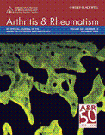Interleukin-6 blockade suppresses autoimmune arthritis in mice by the inhibition of inflammatory Th17 responses
Abstract
Objective
To investigate the mechanism of interleukin-6 (IL-6) blockade in autoimmune arthritis, by comparing the effect of anti–IL-6 receptor (anti–IL-6R) monoclonal antibody (mAb) treatment with the effect of soluble tumor necrosis factor (sTNFR)–Fc fusion protein treatment on T helper cell differentiation in collagen-induced arthritis (CIA).
Methods
DBA/1 mice were immunized with type II collagen (CII) to induce arthritis and were left untreated or were treated with anti-IL-6R mAb or TNFR-Fc. T helper cell differentiation and cytokine expression during the development of arthritis in these mice were analyzed.
Results
Immunization with CII predominantly increased the frequency of Th17 cells rather than Th1 cells. The frequency of FoxP3+ Treg cells was also increased after immunization. Treatment of mice with CIA with anti–IL-6R mAb on day 0 markedly suppressed the induction of Th17 cells and arthritis development, but treatment with this antibody on day 14 failed to suppress both Th17 differentiation and arthritis. In contrast, treatment of mice with CIA with TNFR-Fc from day 0 to day 14 suppressed neither Th17 differentiation nor arthritis, but treatment from day 21 to day 35 successfully ameliorated arthritis without inhibiting Th17 induction. Neither antibody treatment increased the frequency of Treg cells.
Conclusion
Our results indicate that the protective effect of IL-6 blockade, but not tumor necrosis factor (TNF) blockade, in CIA correlates with the inhibition of Th17 differentiation. Our findings suggest that IL-6 blockade in rheumatoid arthritis in human is also likely to involve a therapeutic mechanism distinct from that of TNF blockade and thus may represent an alternative therapy for patients in whom the disease is refractory to TNF blockade.




